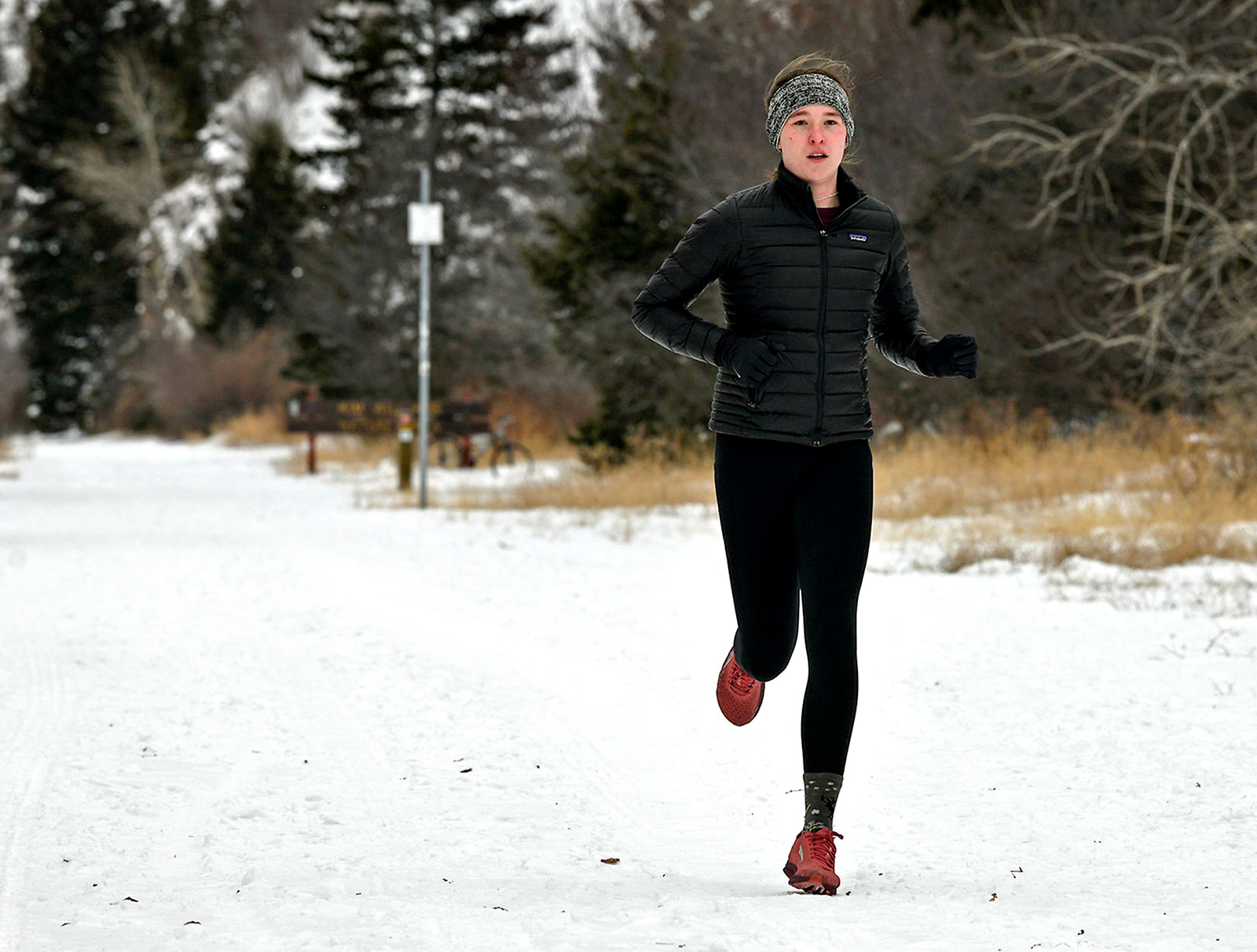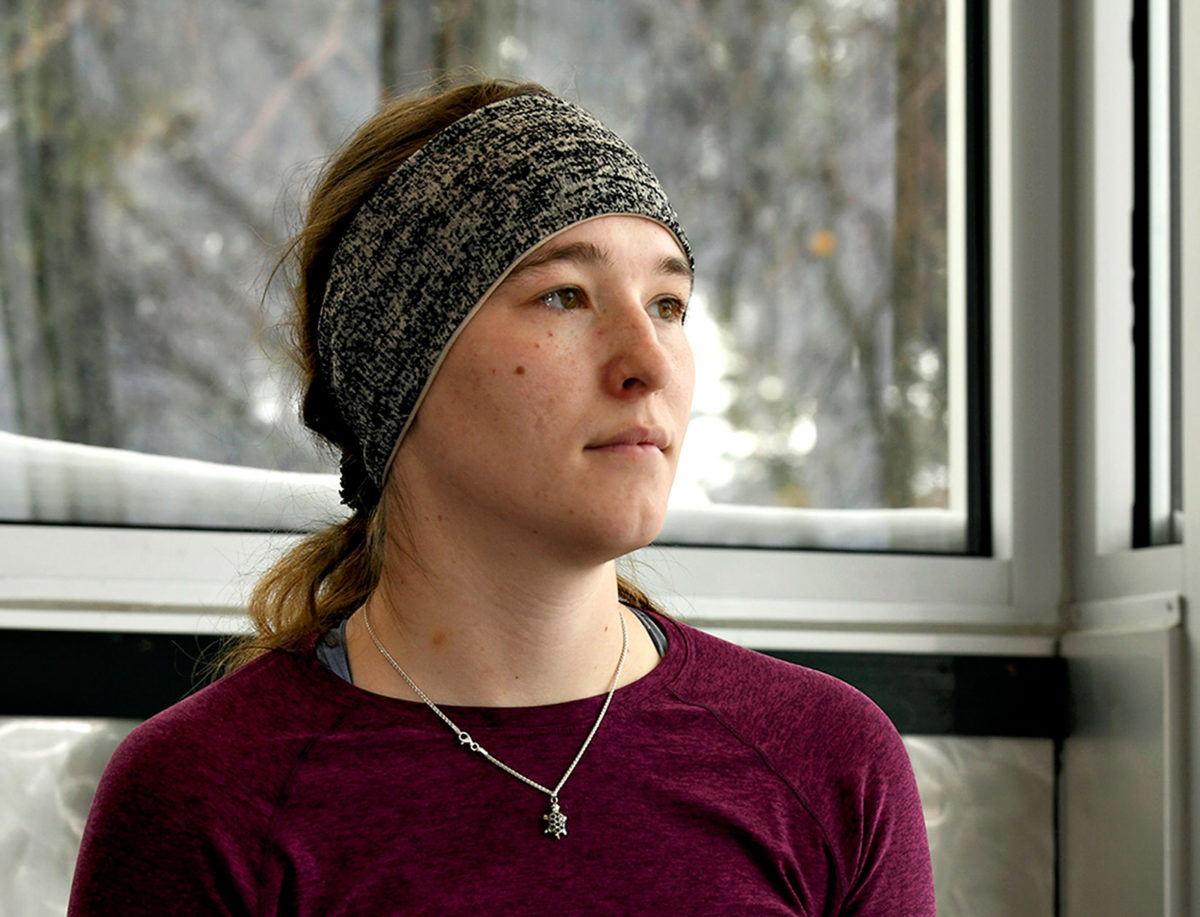The Debate Over Participation and Discrimination
Montana set to join growing number of states restricting transgender athletes
By Micah Drew
When the University of Montana cross country team opened the 2019 season at the Clash of the Inland Northwest in Cheney, Washington, two Grizzly runners finished at the top of the women’s field. Polson native Beatrix Frissell won in her first collegiate meet as a freshman. Twenty seconds and six places behind her was teammate June Eastwood.
For Eastwood, it was a historic run. The then-redshirt senior became the first known male-to-female transgender athlete to compete in an NCAA Division I cross country race. Prior to that she had competed for three seasons on the men’s cross country and track teams before redshirting for a year to make the transition.
“When I wasn’t out, I think I was at such odds with myself, and it’s hard to feel connected to a passion of yours when you don’t feel connected to your sense of gender,” Eastwood said, reflecting on her senior season at UM. “When I was running on the women’s team, I was really close to the girls on the team and felt more comfortable about myself as an athlete and my progress as an athlete.”
Montana is now a pen stroke away from preventing future athletes from following in her footsteps.
In Montana, HB 112, which would block transgender female student-athletes from participating in women’s and girls’ sports, passed both chambers of the Legislature on April 23 and headed to Gov. Greg Gianforte’s desk.
The bill, called the “Save Women’s Sports Act” and sponsored by Rep. John Fuller (R-Whitefish), requires public schools and colleges to designate all athlete teams as specifically for male athletes, female athletes or as mixed, based on “biological sex,” effectively blocking transgender women and girls from participating on teams designated for female athletes.
More than 20 states have introduced near-identical bills this year.
“I have been a vigorous defender of Title IX and women’s sports for over 50 years,” Fuller said. “It’s not discriminatory no matter what people claim because women are allowed to compete in women’s athletics and men are allowed to compete in men’s athletics.”

“I think it’s a strange bill to be pushing so hard; you know, there’s a huge difference between what the constituents are saying and what the legislators are putting forward,” Eastwood said. “This is so far down on the priority list for most voters.”
At the high school level, the Montana High School Association (MHSA) hasn’t identified any issues associated with transgender athletes competing in Montana. The MHSA doesn’t even have a transgender policy, one of just nine states without one. The organization briefly considered a policy proposal in 2015, but it was removed from the agenda for lack of support.
MHSA Executive Director Mark Beckman provided the Beacon with a prepared statement regarding the current bill.
“The Montana High School Association is aware of HB 112 and will continue to monitor this Bill through the legislative session. Montana schools will follow Title IX and the Ridgeway et. al. v. Montana High School Association et. al. Settlement Agreement regarding participation in sanctioned sports and will await clarification from the legislature and/or judicial authorities regarding the application of HB 112 to participation in sanctioned sports in Montana.”
Glacier High School Activities Director Mark Dennehy said the school has not had any transgender athletes who would be affected by the bill.
“First and foremost, we strive to take care of kids in any type of situation and ensure that they feel safe and comfortable while attending our schools,” Dennehy said. “If this bill becomes law, we will work with the MHSA and our district to take care of our kids in the appropriate manner and within guidelines.”
At the collegiate level, Eastwood is the only example in Montana, and as an athlete she was subject to NCAA rules regarding transgender participation. The NCAA policy allowed a transgender female athlete to compete on a women’s team only after completing one year of testosterone suppression treatment. The NAIA has a similar policy in place.
“I think any policy about participation needs to be science informed and adaptable to new scientific information,” Eastwood said. “If more science comes out suggesting trans women need to transition for two or three years before they’re allowed to compete, so be it.”
Rep. Fuller pointed to Eastwood’s performance at the 2020 Big Sky Conference indoor track championships as a reason for the bill, claiming Eastwood took a medal from a woman athlete due to unfair physiological advantages.
“Science is science. You can change your appearance; you can’t change your sex,” he said.
Eastwood says it’s more nuanced than that.
“Women’s sports are sex segregated for a reason — these people aren’t wrong for putting bills like this forward philosophically; there is a difference in physiological ability,” she said. “But it’s not as simple as the argument they make about men being faster than women … They forget about the medical transition.”
Eastwood points out that her times were significantly faster before her transition.
“I’ve done the math on my performances before and after I transitioned,” Eastwood said. “Using a gender and age graded scale, comparatively I was actually slower afterwards.”

The NCAA issued a statement in April on transgender participation, stating, “NCAA policy directs that only locations where hosts can commit to providing an environment that is safe, healthy and free of discrimination should be selected.”
UM Associate Athletic Director Jean Gee spoke to the Legislature about her concerns that the bill could impact Montana’s Division I schools financially.
“I am very anxious about the passage of this bill and how it will impact both UM and MSU’s ability to host NCAA championship events (specifically FCS football playoffs), as well as Big Sky Conference championships, and possibly even regular season events,” she told the Beacon in an email, citing the controversial 2016 “bathroom bill” in North Carolina that led the NCAA to pull seven championships from the state, costing both the state and university substantial sums of money. Gee also cited a 2016 study that estimated a home football game in Missoula generated about $2.53 million for the Missoula community, indicating that losing three playoff football games would be devastating economically.
“I wasn’t aware the NCAA paid money to the state of Montana,” Fuller said, mentioning that states would likely join a class action suit against the NCAA. “They’re going to cancel playoffs in those states and lose that kind of revenue? I don’t think so.”
According to the Associated Press, five states have signed bills banning transgender girls from competing on girls’ sports teams, while at least two governors have vetoed similar legislation. HB 112 is one of roughly 300 bills awaiting a decision by Gianforte as the Beacon went to press on Monday.
“I’m not expecting the governor to veto the bill, but I know several people have met with him and Lt. Gov. Juras and addressed this, trying to humanize the people that it will impact,” Eastwood said. “I anticipate a lawsuit coming forward, but ultimately I hope that any closeted trans kids out there trying to compete know that there are people who will fight for them to compete in a fair and meaningful way, for both them and the athletes they’re competing against.”